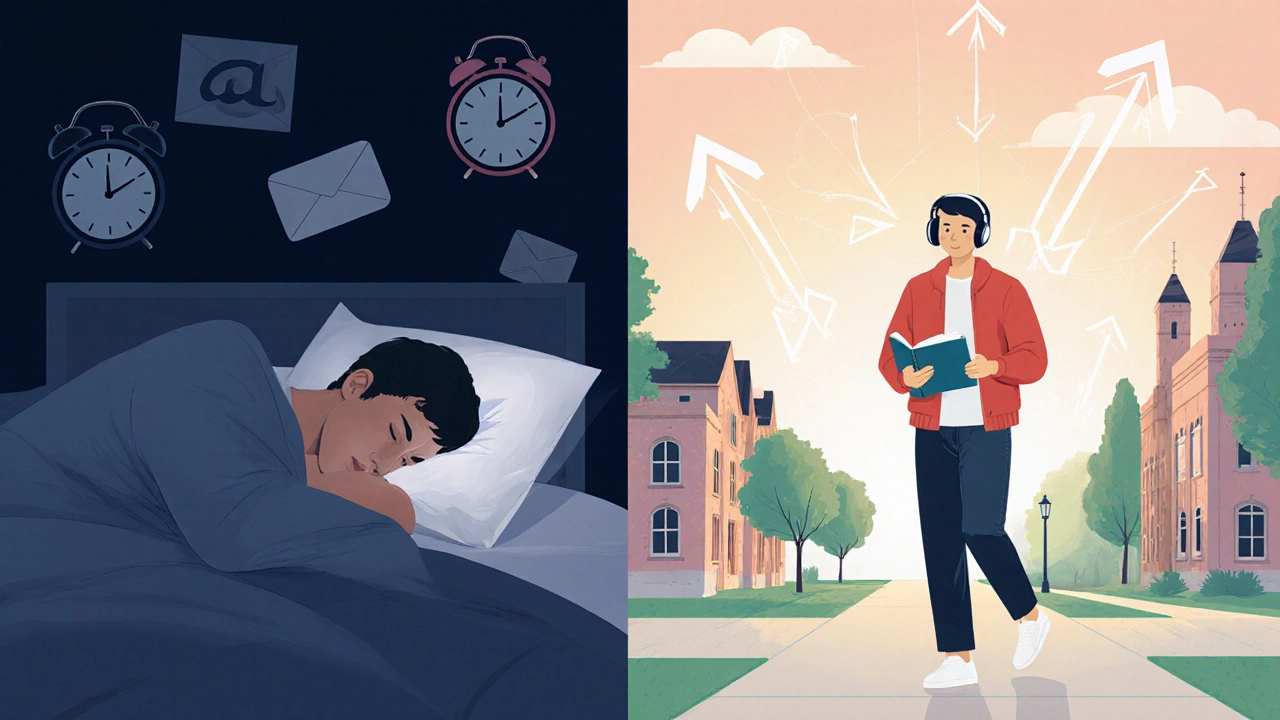
If you’re a student in the UK thinking about telling your university about your mental health, you’re not alone. Thousands of students do it every year-and most wish they’d done it sooner. It’s not about being ‘broken’ or ‘needing help.’ It’s about getting the right support so you can actually focus on your studies, sleep better, and feel like yourself again. The truth? Universities in the UK are legally required to help you. You just have to speak up.
What Happens When You Tell Your University?
When you disclose your mental health condition-whether it’s anxiety, depression, bipolar disorder, OCD, PTSD, or something else-you’re not signing up for extra attention or stigma. You’re unlocking access to real, practical support. This isn’t just a kindness. It’s a legal duty under the Equality Act 2010. Universities must make reasonable adjustments so your condition doesn’t put you at a disadvantage.What does that look like in practice? Maybe it’s extra time on exams, the option to submit assignments late without penalty, a quiet space to take breaks during lectures, or permission to record classes if you struggle to focus. Some students get a dedicated mental health advisor. Others get flexible attendance policies. One student at the University of Manchester told me she got to take her exams in a separate room with no clock visible. That small change cut her panic attacks in half.
Your Rights Are Clear-Here’s What You’re Entitled To
The Equality Act 2010 says a mental health condition counts as a disability if it has a long-term effect (12 months or more) and substantially impacts your daily life. That includes things like concentrating, sleeping, leaving the house, or managing emotions. You don’t need a formal diagnosis to qualify. If your condition affects your studies, you’re protected.Universities can’t refuse to make adjustments just because they’re ‘inconvenient’ or ‘too expensive.’ They’re expected to cover the cost. If they say no, you can appeal. Many students don’t know this, but they can also request support through the Disabled Students’ Allowance (DSA). DSA isn’t a loan. It’s a grant that pays for things like:
- Specialist software (text-to-speech, mind-mapping tools)
- One-on-one study skills tutors
- Non-medical helpers like note-takers or mentors
- Equipment like noise-canceling headphones or ergonomic chairs
Even if you’re not eligible for DSA, your university still has to make adjustments. You don’t need to prove your condition is ‘bad enough.’ You just need to explain how it affects your learning.
How to Disclose-Without Feeling Overwhelmed
Telling your university doesn’t mean writing a novel or having a formal interview. Most students start by emailing their student support office or disability services team. You can say something simple like:‘Hi, I’m [Your Name], a student in [Course]. I’ve been dealing with [anxiety/depression/etc.] and it’s affecting my ability to keep up with deadlines and attendance. I’d like to know what support is available.’
You don’t have to share details you’re not comfortable with. You don’t have to send medical records unless asked. The university will likely send you a form to fill out. It’s usually straightforward: name, condition, how it affects your studies, and what help you think would help.
Some students worry their tutors will treat them differently. But most staff are trained to handle this. A 2024 survey by the Student Minds charity found that 87% of students who disclosed their mental health said their university responded with empathy and professionalism. Only 5% reported negative experiences.
What You Don’t Have to Do
There are myths that scare people away. Let’s clear them up:- You don’t have to tell your professors directly-unless you want to. The disability team handles communication.
- You don’t have to tell anyone else on campus. Your information is confidential.
- You don’t have to disclose if you’re not ready. You can wait until you feel safe.
- You don’t have to be ‘diagnosed’ to get support. Many students get help before seeing a doctor.
- You don’t have to pay for anything. DSA and university adjustments are free.
Some students fear disclosure will show up on their transcript or affect job prospects. It won’t. Universities don’t share this information with employers. No one sees your mental health records unless you give permission.

What If You’re Not Sure You Need Help?
You don’t have to be in crisis to reach out. Many students wait until they’re overwhelmed. But the best time to ask for help is before things spiral. If you’ve been:- Missing classes because you can’t get out of bed
- Struggling to focus during lectures
- Feeling constantly on edge or numb
- Putting off assignments because you’re scared of failing
-then you’re already experiencing the impact. You don’t need to ‘earn’ support. You just need to speak up.
Real Stories, Real Results
At the University of Edinburgh, a student with severe social anxiety started by emailing one line: ‘I can’t attend seminars because I panic.’ Within a week, she was offered online seminar participation and a mentor. She graduated with first-class honors.A student at King’s College London had panic attacks during exams. He didn’t tell anyone until his final year. Then he asked for extra time and a quiet room. He passed all his modules. ‘I thought I was weak for needing help,’ he said. ‘Turns out, I was strong for asking.’
What Happens After You Disclose?
After you submit your request, you’ll likely have a meeting with a disability advisor. They’ll work with you to create a Personalised Learning Plan (PLP). This document lists your needs and the adjustments your university will make. You’ll get a copy. Your tutors will be informed (only about what’s necessary). You can update the plan anytime-like if your condition changes or you need more support.Some universities offer mental health workshops, peer support groups, or free counseling. These are often separate from your disclosure. You can use them even if you don’t formally disclose. But if you do disclose, you’ll get priority access to these services.

What If Your University Says No?
If your university refuses to make adjustments, you have rights. First, ask for their policy on disability support. Every UK university must have one. If they’re not following it, you can escalate. Contact your student union-they have trained reps who help with this. You can also file a formal complaint. In 2023, the Office for Students (OfS) issued guidance reminding universities they’re legally required to act. Over 200 complaints were resolved that year after students pushed back.Don’t accept ‘no’ as final. You’re not asking for special treatment. You’re asking for equal access.
Why This Matters More Than You Think
Mental health conditions are the leading reason students take a break from university in the UK. In 2024, over 18,000 students took a leave of absence due to mental health. Many of them later said they didn’t know support was available-or they were afraid to ask.Disclosure isn’t weakness. It’s strategy. It’s how you protect your future. You’re not just asking for help with assignments. You’re asking for the chance to finish your degree without burning out. You’re asking for the right to learn in a way that works for you.
And here’s the quiet truth: universities want you to succeed. They’re not trying to make your life harder. They’re legally required to help you-and most of them are eager to do it.
Do I need a doctor’s note to disclose my mental health to my university?
No, you don’t need a doctor’s note to start the process. You can tell your university how your condition affects your studies, and they’ll work with you. But if you want to apply for the Disabled Students’ Allowance (DSA), you’ll eventually need some documentation-usually from a GP, psychologist, or psychiatrist. The university’s disability team can guide you on what’s needed.
Will my parents find out if I disclose my mental health?
No, your disclosure is confidential. Universities treat mental health information like medical records. They won’t contact your parents unless you’re under 18 or you give explicit permission. Even then, they’ll only share what’s necessary.
Can I disclose after I’ve already failed an exam or missed deadlines?
Yes. You can disclose at any point-even after a poor result. If you’ve been struggling with your mental health, you can ask for mitigating circumstances to be considered. Many universities will review past grades or allow you to retake assessments if your condition affected your performance.
Does disclosing affect my student loan or funding?
No. Disclosing your mental health has no impact on your student loan eligibility or amount. The Disabled Students’ Allowance (DSA) is separate from your loan and doesn’t need to be repaid. You can receive both.
What if I’m an international student? Do I have the same rights?
Yes. The Equality Act 2010 applies to all students studying in the UK, regardless of nationality or visa status. International students are entitled to the same adjustments and support as UK students. Many universities have dedicated international student support teams to help with the process.
Next Steps: What to Do Right Now
If you’re thinking about disclosing, here’s what to do in the next 48 hours:- Find your university’s disability or student support services website. Search for ‘disability services’ or ‘student wellbeing’ on your uni’s site.
- Send a short email. No script needed. Just say you’d like to discuss support options for your mental health.
- Write down how your condition affects your studies. Even one sentence helps: ‘I have trouble concentrating in large lectures,’ or ‘I miss classes when I’m overwhelmed.’
- Don’t wait for ‘perfect timing.’ The sooner you reach out, the sooner the support kicks in.
You’re not asking for a favor. You’re claiming a right. And you deserve to finish your degree without sacrificing your mental health to do it.